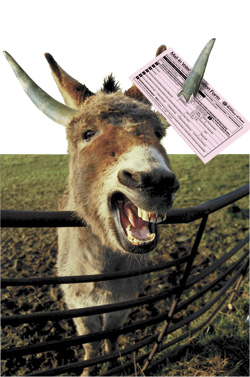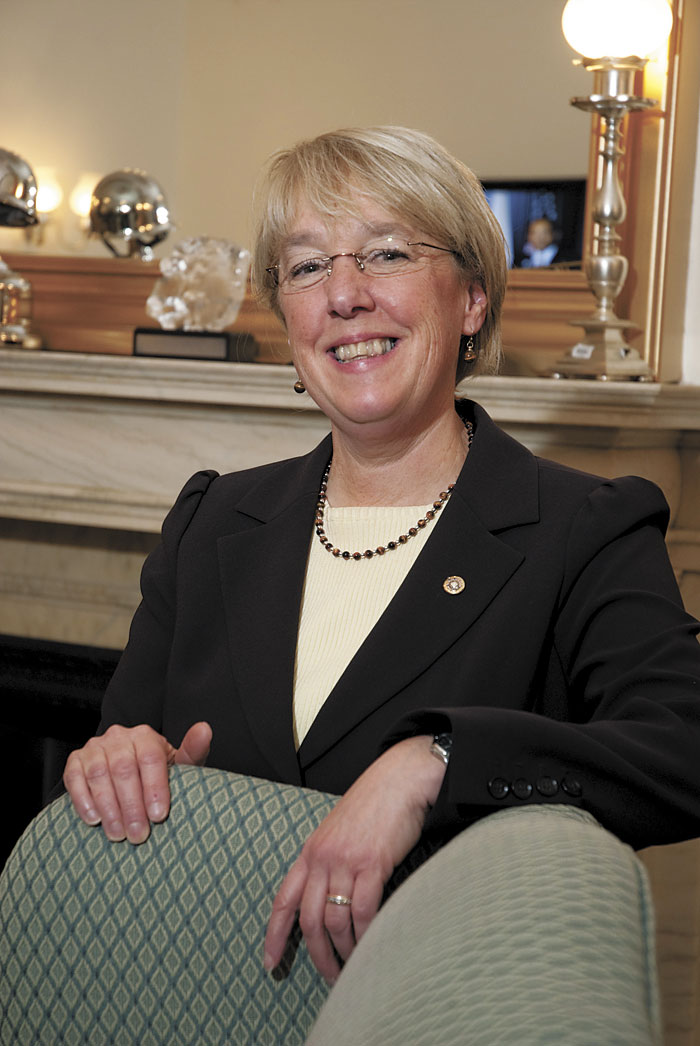Washington’s Feb. 9 precinct caucuses brought record turnout, cramped quarters, and heated arguments to gatherings statewide. But the next round in April could bring chaos.
Some of the delegates and alternates selected in February to participate in the next stage of the process, the legislative district caucuses, aren’t even registered to vote, while others were elected as delegates in the wrong precinct. Jim Sharpe, a member of Kitsap County’s credentials committee, estimates that more than 10 percent of the 2,300 delegates and alternates elected in his county fit into one of these categories, with the vast majority falling into the former.
Here, Sharpe is troubled by the fact that some counties aren’t vetting their delegates to make sure they pass muster. “My biggest problem with all this is how well we as a party can actually do this process if people are treated differently in different areas,” he says, adding that the Kitsap Democrats will likely end up disqualifying delegates who were elected in the wrong precinct. He’s less certain about what will become of the unregistered delegates, some of whom may ultimately prove to be legit if they signed up the day of the caucus.
Sharpe estimates he’s put about 100 hours of his own time into compiling the list and running it against county records. But for most legislative districts, volunteers are simply too busy inputting the delegates’ names to check them against voter rolls or precinct boundaries. For instance, Roger Crew, who chairs the credentials committee in the 41st District, which includes Mercer Island and parts of Bellevue, says he and other volunteers have been working round the clock for weeks just to get basic data such as names and addresses entered for all caucus participants.
The 41st had about 8,100 caucus-goers this year, compared to 2,400 in 2004—a number Crew says was considered at the time to be a “100-year flood.” All told, the district has 860 delegates and 780 alternates.
“We do all this work on our own dime,” Crew says. “We try to do as much matching as we can, but to some extent how the system works is that we generally take people at their word when they show up at the precinct caucuses because we can’t do anything else.”
“Nonregistered voters should not be delegates,” says Washington State Democrats spokesperson Kelly Steele. But he says the party isn’t going to stage “a witch hunt” of the 33,000-plus delegates from the precinct caucuses. “Local party organizations are doing their due diligence to make sure delegates are property credentialed,” he says.
King County Democrats Chair Susan Sheary says she thinks a “good portion” of the legislative districts have scrubbed their delegate lists or will be able to before the next round of caucuses in April, but adds that there will be some discrepancies with the voter rolls in terms of who’s registered or whether they voted at the correct precinct.
“I’ve heard as high as 10 percent statewide,” she says, though she stresses this is a rough estimate that’s not verifiable, likely because not every district has turned in its delegate list, let alone checked it.
If party volunteers aren’t able to assess the legitimacy of delegates, it falls to the candidates’ campaigns, which theoretically will get the list of delegates and alternates in time to vet them before the district caucuses occur. If a campaign wants to challenge a delegate’s legitimacy, it must take up the issue with an individual district’s credentials committee (there are 49 districts statewide).
“Generally the challenges are rare,” says Crew. “But usually by this time the race is settled.”
Though Barack Obama won every county in the state during the February caucus and prevailed over Hillary Clinton 67 percent to 31 percent overall, the race is still so close nationwide that the campaigns are going to have a heavy hand in wrangling for the support of each and every delegate.
“It’s very important that both Clinton and Obama turn out their people to this next level because the math can change,” says Paul Berendt, the former state Democratic Party chair. “There may be a few more problems this year because of the greater volume of people who turned out. I’m expecting a few more credentials challenges. It’s not a fait accompli who’s going to be the nominee. People are going through this with a fine-toothed comb, and they should.”
However, Berendt rejects the notion that upwards of 10 percent of the delegates were not registered to vote or voted in the wrong place. “In my own precinct [Olympia’s 35th], I verified everyone,” he says.
Jim Kainber, a Clinton volunteer and former executive director of the state Democratic Party (where he worked under Berendt), says getting the delegate lists has taken longer than usual, though he won’t discuss the extent to which the Clinton campaign is vetting its delegates in advance of the next round. He says it speaks to strategy.
“It’s certainly in the campaign’s best interest to figure out if there are any credential challenges and get them taken care of,” says Obama volunteer Richard May. “Everyone’s doing the best that they can.”
Kitsap’s Sharpe, a Clinton supporter, says having the campaigns lead the challenges in a competition that’s already supercharged is exactly what he’s afraid of. “If we as a credentials committee can say we’re not seating the following delegates, that’s one thing; but if the Obama camp tries to strike X number of Clinton people or vice versa, that deteriorates into a place that I would not like to see us go. There’s already enough bad blood brewing out there.”
While it may not be pretty, the conventional wisdom is that this mess will eventually sort itself out. After all, only a small percentage of the delegate hopefuls at the legislative district caucuses will proceed in May to the next level, the congressional district caucuses.
For example, in the 36th, the district that includes downtown Seattle, Queen Anne, and the neighborhoods that make up most of the city’s vast northwest quadrant, a couple of thousand delegates will get winnowed to 67 for the congressional district caucuses in May, and only a pair will make it from there to August’s national convention in Denver.
In years past, when the level of interest hasn’t been nearly as high, the party could count on delegates not showing up or on those who came not caring about advancing to the next step. But, says Sharpe, “This year it’s nuts because everybody wants to go to Denver.”
District leaders are also struggling with how to stage the April vote. Delegates traditionally are afforded the opportunity to introduce themselves and briefly make their case. But that may simply not be feasible given the crush of delegates expected to show up.
Another challenge for the campaigns is that the next round of caucuses aren’t being held on the same day statewide. Most of the districts will convene on April 5, though two will meet April 12, eight will be held the 19th, and one caucus still hadn’t been scheduled as of last week.
“This is hellish for organizing,” says Clinton volunteer Kainber.
Like Sharpe, Clark County resident Norm Banks, a retired vulcanologist and longtime party volunteer, has made it his mission to scour the delegate list for his entire county. So far, he’s found that only 2 percent of the delegates in Clark County are either not registered or voted in the wrong place.
Banks says he’s not sure how this compares with past years because the Clark County Democrats have never vetted their delegates en masse. So why this year? “If we go to court, I want to be able to say, ‘This is where we are; this is what we have,'” he says, adding that he’s opposed to the current caucus system because “they’re too big; we can’t handle them anymore.”
This is a familiar argument for Secretary of State Sam Reed, who fought last year to have the primary be Washington’s nomination vehicle of choice. When the Democrats said no, he held one anyway in what amounted to a very expensive, taxpayer-funded beauty contest. (The Republican Party used the February primary to allot half of its delegates, tapping the rest from caucuses.)
Reed says it’s precisely these kinds of squabbles over delegate registration and other credentialing issues that brought about the move from caucuses to primaries in the first place. He says primaries are simply more credible because they are conducted by the public, not by the parties.
“I think caucuses serve an important function in terms of party organization,” Reed says. “I’m not suggesting we totally eliminate them, but in terms of who’s running for president of the United States, it isn’t the appropriate vehicle.”






